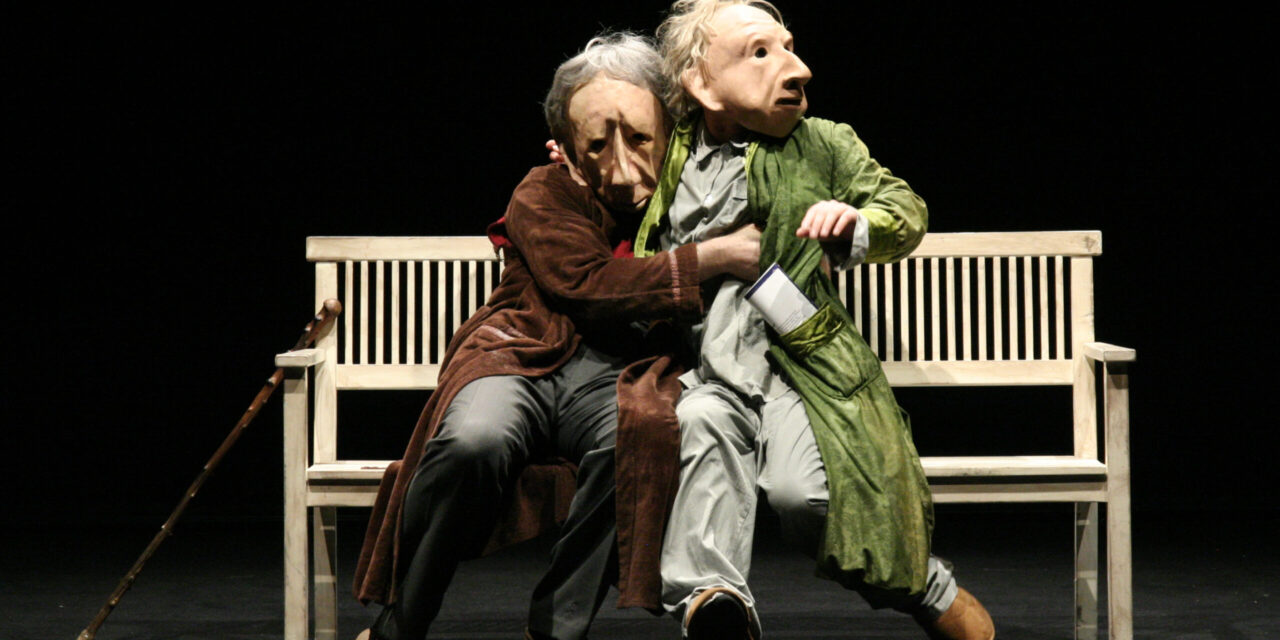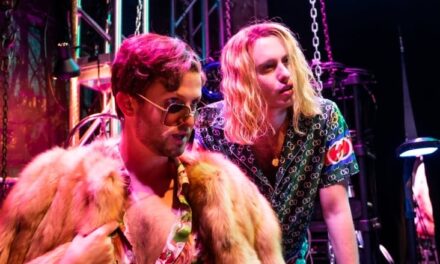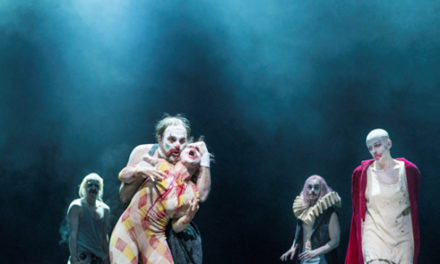Led by artistic directors Hajo Schüler and Michael Vogel, Berlin-based “Familie Flöz” is one of the most famous theatre companies in Europe, with a unique style in the use of masks, improvisation, introspection and not-verbal communication. With the slow coming back to normality, after the first peak of the Covid-19 emergency worldwide, in September 2020, “Familie Flöz” will start again performing physically and in presence at the Schiller Theatre in Berlin with two productions of their repertoire: Infinita (22-24 September) and Hotel Paradiso (25-27 September). Performances that will be influenced by the new social, artistic and economic conditions given by the pandemic. We have the pleasure to talk about it with director Michael Vogel.
Coronavirus pandemic has sensibly affected works of almost all the theatre company worldwide, with productions and tours cancelled and venues that had to shut down. In this context, many companies tried to find alternative way to continue working and remain in contact with their audience. E.g. using the digital and online. However, digital and online are very difficult for an ensemble such as “Familie Flöz”, that has at its core the physicality, the movement, the mask and the interaction. How did “Familie Flöz” live this period and how is it living this transition to a “normality”?
First of all, we wish we can come back to a normality and to our normal business, but we know that it will be a difficult and slow process. There are also a lot of theatres that are making contracts now and reassure a normal business starting in September, but we know that everything can change very quickly. Sometimes, we will have to play double shows because there are less public due to the distance norms, but our wish is that we will still continue to make theatre live in presence. But in a way, I think also that a virtual persona, a “camera”, is maybe a possibility in order to have an additional public in streaming for the performances. Until now, as a theatre company, we haven’t really thought to do something for the internet or for the online media, because I think that “mask” is already a specific medium and the camera is also already another specific medium. And camera is “flat”, while mask needs the three-dimension element. Also the time is important. I can imagine that the people that are there in the theatre can feel, e.g., the atmosphere and, if you join this time when everything is happening, it could have an impact. If I am one of the 250 people there, it is much more different compared if I see something that was recorded weeks before or even months before. Online is something we are thinking about, but it is something we are not doing. We are waiting till the situation develops and to see how it will start in September, October and November.
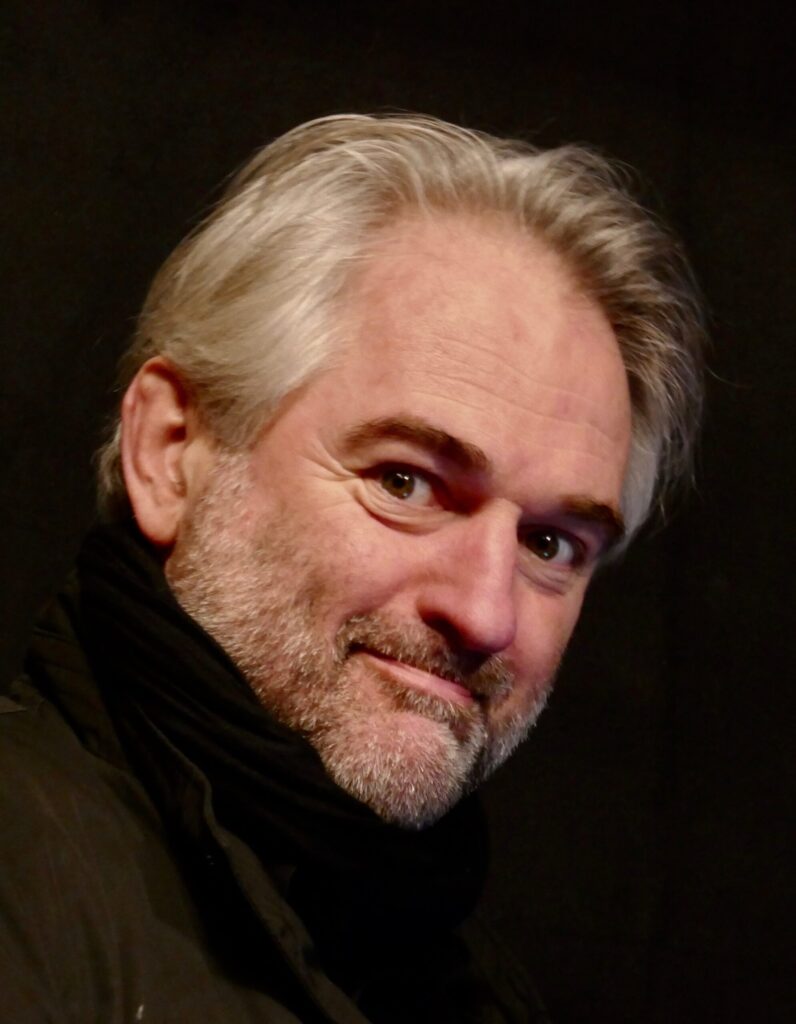
Michael Vogel. All the pictures by concession of Familie Flöz Theatre Company.
You underlined how the situation in theatre venues can change very quickly and how you have to perform more because of less audience allowed in the house. How many audience members will be allowed in Schiller Theatre for example?
This number really changes day by day. Some days ago, I talked with the theatre management. For now the theatre is officially 1000 seats, but only 250 will be allowed. A quarter. It is the same also in Duisburg. There were 150 seats originally allowed, now 300. As said, everything changes in terms of seats and distance among audience members almost every day.
This will have a very strong economically impact and in terms of audience reception.
Yes, it will have an impact. Absolutely. But talking with the audience who already experienced this new “audience placement”, they say it is very interesting in a way to see the performance in these new positions, separated from the friends and mates. They say it is similar to cinema. In a cinema, many times, you look for a seat and a distance from the others. However, theatre has always been different. When theatres sell tickets for different areas and with different prices, if the house is not full, I always say “Come on, bring them to the front”, because I need that the people sit together, enjoy together, laugh together. This will really change now.
Economically, how will it be this new context?
It will be difficult for sure. Less performances and less paid. Double performances for the same prices or less. A huge impact. For this reason, there is maybe the idea of use a balance with the virtual, I don’t know if the people would pay for the streaming. Even donation, but there is no culture yet for this.
Do you think that the audience will be scared or worried to be one or two hours sit in a indoor space next to each other?
Well, I see how the ticket selling is going for September and I think that, nowadays, they are scared. Because the selling is slow. People are waiting and they wait for the development of the current situation. I talk also for myself. Until now I haven’t bought any tickets. I wait. I am near the 60 and theatre audience in Germany is more or less elder. In some theatre environment, of course, they have a younger audience. But for example when you are on tour, if it is not a festival or a special house or context for young people, most of our audience member are older than 40.
Germany is supporting arts and performing arts with funding, in some cases much more than in other European Countries.
There are different programmes. Also new programmes now. One of these is that everyone – very quickly – gets some money from the State. Then there is this programme that really don’t work and make you really feel like you have lost your job, while, in reality, we want to save our working positions and possibilities to earn money. Since March till now, many actors have to find other opportunities in order to earn money.
Among the different prominent companies based in Berlin, “Familie Flöz” is probably one of the most famous abroad also thanks to the several tour through the years. How will it be next year in terms of performing in Germany and touring abroad? In some Countries, event very affected by Covid like Spain or Italy, festivals are, for examples, starting again in presence, while in Germany the situation seem paradoxically slower.
Our focus is now really to stay here in Germany and to develop projects in Berlin. This is our focus at the moment, because in this we all believe. We believe that there would be possibilities to stay at home. “Stay at home”, like the campaign. But of course we have a lot of contracts all over the world and we hope we can be on tour again, but you know with all these issues with flights, movement restrictions, and quarantine it is very complicated. Also inside Germany there could be borders. These are very strange times for touring theatres. So, we will be in Berlin and build an audience as we did from the 90s to 2008. We used to play here every two weeks, first in the Arena and then in the Admiralpalast, in the studio. And we really played there a lot.
Are you thinking to alternative ways of funding, as reinforcing educational programme? Apart from the summer academy in Italy, also more workshops during the year
We are thinking about it. We are also thinking about supporting from the audience. We never did because we never had the need. But we are thinking to have saves money for the rent, for insurance, for administration and of course salary. Usually a crew is 32 people in touring time and 50 in production
Talking about “Familie Flöz”, what has made the “language” of your company so universal and at the same time unique?
I think it is language that is known everywhere and we use it. It is a language in which everyone is a specialist, even though sometimes audience needs a 15-minute time to accept that no one is verbally speaking. Some people are maybe more able to read and understand this language compared to others but it is a language that is absolutely understandable. You use only the body and put the words away, that is a limited thing in a way but in this limitation you have infinite possibilities.
How is the creative process at “Familie Flöz”? The company has two artistic directors. Do the projects start after conversations between you and Hajo Schüler or there is also the participation of the other members of the company?
If I look back a lot of projects started after a conversation between Hajo and me, but, growing and with more people in the last productions, we involved more people we wanted to work with and we used to speak in a big circle about the new production. Let’s say that every production is different. We never work with all the same people. At least one or two members are different, and specialist in something. We take the decision to start when the team is there, the team of authors, who want to create. Five or six people always. We create and we are the author. Till now I have always been the director, while Hajo is usually on stage. At the beginning I also created masks, but then we agreed that Hajo was better in mask making and I preferred to be outside and develop as a director.
How long is usually the production period of a show?
No rules. Sometimes a production time could be also 2 years. But generally I would say 1 year and in this year we are working 4 months on the production. The entire development is generally 12 months from the idea to the staging including: 1 month for the writing, 2 months for the production and rehearsal, then the masks, and 1 month for the real staging. I am with them as a director a 20 performances minimum.
In terms of performers’ skills and training, which kind of artists does “Familie Flöz” look for?
Our people are trained first of all as actors. People that are trained only in dance or dance-theatre could have in doing our theatre. They need an acting work as a background. Also Stanislawki. The influence in our school in Essen – Folkwang Univerity – was also from Lecoq, the mask work specially, and the clown. But it is not only from an educational perspective. It is to see the world like this. If you see Pina Bausch and her artists, they are really different, they are dancer and they think in a different way. The think about how they move, instead of why they move and what move them, what is the reason for. We have people from Lecoq, people from Die Etage here in Berlin, the mime school, trained in a mime way, but what we do is not mime anymore. It is more acting without words. We are at the point when words are not necessary anymore.
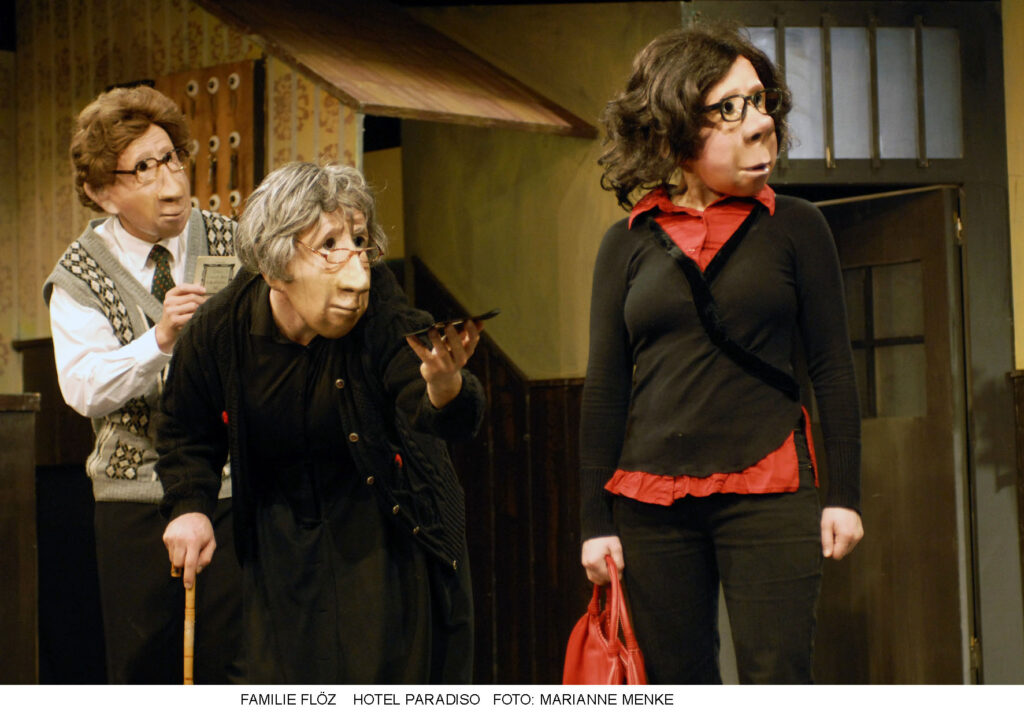
All the pictures by concession of Familie Flöz Theatre Company.
“Familie Flöz” will be back in presence at the Schiller Theatre in Berlin with two productions of their repertoire, Infinita (22-24 September) and Hotel Paradiso (25-27 September). Can we talk a bit about these two shows?
Infinita was for me a very personal work. When we started my child was born and my parents died more or less in the same period. It was 1997-2004 and then we did it in 2006. I usually never go in and direct, but this time I said I need to be on stage. I want to be there and I love to perform it, and I am waiting for these three performances in September. Because it is still the original cast. It was really a work that takes a long time, because at that time, originally, the theatre was not ready. It was the first thing we were showing in Admiralpalast and we wanted to perform it in May but the theatre was not ready in October, so we performed in the Akademie der Künste. Hotel Paradiso was more or less the same time. Another cast. I directed it. It was really difficult because it breaks down and 2 years later we started with a new cast. Same team but a new cast and in a way it was the longest production in the company. Since the beginning, I believed it was a good work. And we started to change, re-write and now it is one of the biggest successes we have. A family story. It is about difficulties, brothers and sisters, basic stories in family, and in this way touching the stories of many people.
This post was written by the author in their personal capacity.The opinions expressed in this article are the author’s own and do not reflect the view of The Theatre Times, their staff or collaborators.
This post was written by Armando Rotondi.
The views expressed here belong to the author and do not necessarily reflect our views and opinions.

